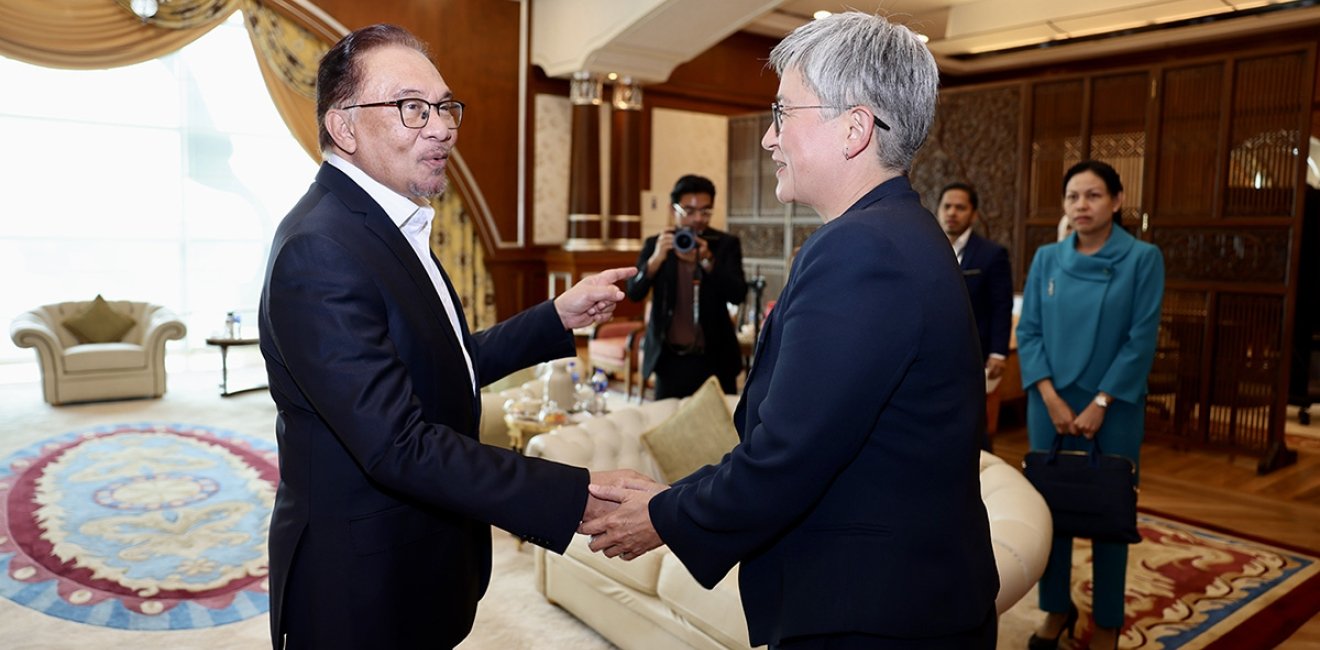How Will Malaysia’s Foreign Policy Under Anwar Ibrahim Play Out?
The dynamic bears careful watching due to Malaysia’s significance and wider Indo-Pacific trends at play.

A blog of the Indo-Pacific Program
The dynamic bears careful watching due to Malaysia’s significance and wider Indo-Pacific trends at play.

While Malaysian Prime Minister Anwar Ibrahim’s recent foreign overseas trips have produced no shortage of headlines, they have also raised a broader question about how Malaysia’s foreign policy may play out under his leadership. This dynamic bears careful watching, both due to Malaysia’s own regional and global significance as well as wider trends at play in the Indo-Pacific region and the international system more generally.
While there has been some continuity in Malaysia’s foreign policy over the past five decades on general priorities – including managing ties with neighboring states, expanding the country’s role in key regional and global fora and an attempt to maintain equidistance between major powers, including the United States and China – there has also been some change amid that continuity. Following Malaysia’s foreign policy under Najib Razak (2009-2018), who was ousted following a shock election in May which brought the Pakatan Harapan government to power under former prime minister Mahathir Mohamad, we saw the beginning of what looked like some key contours of thinking, with the release of documents such as a defense white paper and new foreign policy frameworks in 2019 and 2021. Yet the downfall of the PH government in 2020, and the short terms of Muhyiddin Yassin and Ismail Sabri before Anwar Ibrahim’s victory elections last year, have seen the country consumed by domestic political shifts amid changes in its external environment.
Thus far, the first few months of Anwar’s tenure have unsurprisingly seen more predictable contours in his foreign policy agenda, albeit not without its share of concerns.
Anwar’s ascension as prime minister raises the question of the extent of continuity and change we may see in Malaysian foreign policy under his tenure. Whatever the domestic challenges Malaysia faces, the country still viewed as a key voice on issues affecting Southeast Asia as a region, be it the ongoing situation in Myanmar, the shifting supply chain landscape or the environment of heightened U.S.-China competition. Anwar himself has also long been a seasoned thinker on foreign policy matters, with views on an array of subjects over the decades and extensive connections with leaders not just in Asia, but globally as well out to the Middle East, Europe and the United States.
Thus far, the first few months of Anwar’s tenure have unsurprisingly seen more predictable contours in his foreign policy agenda, albeit not without its share of concerns. The highlights of Anwar’s initial tour of a string of Southeast Asian states have included Malaysia inking its first-ever green economy agreement with Singapore, recalling its mediation role on the southern Thailand insurgency, stressing the importance of intraregional and institutional opportunities in trade and investment in the face of U.S.-China rivalry and signaling a strong position on Myanmar (a statement later clarified by the foreign ministry). Anwar’s government emphasized the investment gains from his visit to China in the context of the country’s quest for post-pandemic growth, but evaluations of the trip were overshadowed by fuss over South China Sea policy, even though Malaysia’s stated position did not itself show any signs of major change.
Beyond the Indo-Pacific, he has engaged with leaders including from the Middle East, with cases in point being his quick trip to Turkey where Malaysia has been assisting in search and rescue and humanitarian efforts following a massive, deadly earthquake, and Saudi Arabia, where there was some focus on new commercial opportunities beyond the hype over the meetings he did not end up having with the royal family. Anwar’s recent budget speech, which included quotations from the Quran to Rabindranath Tagore, saw investments that will help address foreign policy concerns such as tackling illegal scams, and Malaysia’s foreign ministry has highlighted that the concept of Malaysia Madani (Civil Malaysia), which seeks to place emphasis on the country’s humanity, will also be promoted internationally.
Yet tougher tests, and perhaps clearer signals, lie ahead. For instance, on the defense side, ongoing developments and potential crises will increase the scrutiny on how the PH government is resourcing Malaysia’s defense priorities amid continued significant shortfalls, even as it advances other noteworthy objectives like promoting more transparency in defense procurement as outlined in the 2019 Defense White Paper. Similarly, while the PH government’s election manifesto signaled largely continuity in terms of promoting a respected Malaysia on the world stage, including avoiding Malaysia getting caught in great power conflicts and being active in ASEAN, this will be tested as Anwar actually embarks on foreign trips that involve key powers, including the United States. This will likely continue to remain a theme through Anwar’s tenure.
...Malaysian policymakers themselves recognize that despite their best efforts, the success of Anwar’s wider foreign policy outlook will partly hinge on economic gains that in turn hinge on a positive global outlook...
Of course, these developments will unfold with their share of challenges. Given that Malaysia has now had four prime ministers in five years and with some key state elections approaching, some observers may place a greater focus on the country’s domestic politics first and foremost and be cautious about early signals of the country’s international outlook and looking too far ahead, including to Malaysia’s ASEAN chairmanship year in 2025. And Malaysian policymakers themselves recognize that despite their best efforts, the success of Anwar’s wider foreign policy outlook will partly hinge on economic gains that in turn hinge on a positive global outlook, which can help minimize disruptions to new economic measures and drive foreign direct investment back into the country.
Yet given Anwar’s deep historical engagement with regional and global affairs, the evolving contours of his government’s evolving foreign policy, and how it affects the trajectory of Malaysia’s wider approach to the world, his approach to the international arena will remain key to monitor in the coming weeks and months. If history is any guide, even a domestically-consumed Malaysia can chart out some key international positions and approaches that could end up having implications for dynamics in the Indo-Pacific and beyond.
Follow Prashanth Parameswaran, Asia Program Global Fellow, on Twitter @ASEANWonk.
The views expressed are the author's alone, and do not represent the views of the U.S. Government or the Wilson Center. Copyright 2020, Asia Program. All rights reserved.


The Indo-Pacific Program promotes policy debate and intellectual discussions on US interests in the Asia-Pacific as well as political, economic, security, and social issues relating to the world’s most populous and economically dynamic region. Read more
